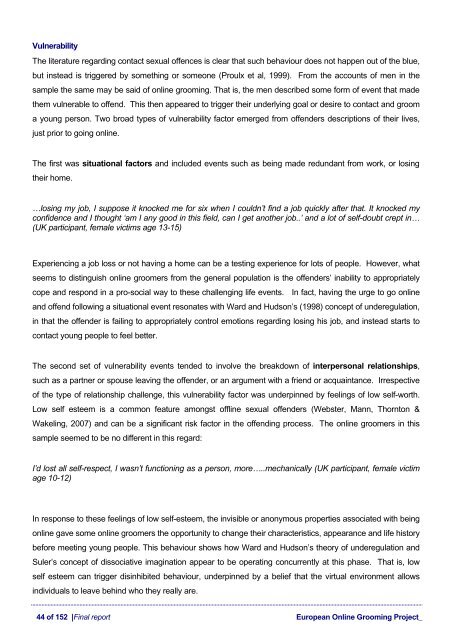Final Report - European Online Grooming Project
Final Report - European Online Grooming Project
Final Report - European Online Grooming Project
Create successful ePaper yourself
Turn your PDF publications into a flip-book with our unique Google optimized e-Paper software.
Vulnerability<br />
The literature regarding contact sexual offences is clear that such behaviour does not happen out of the blue,<br />
but instead is triggered by something or someone (Proulx et al, 1999). From the accounts of men in the<br />
sample the same may be said of online grooming. That is, the men described some form of event that made<br />
them vulnerable to offend. This then appeared to trigger their underlying goal or desire to contact and groom<br />
a young person. Two broad types of vulnerability factor emerged from offenders descriptions of their lives,<br />
just prior to going online.<br />
The first was situational factors and included events such as being made redundant from work, or losing<br />
their home.<br />
…losing my job, I suppose it knocked me for six when I couldn’t find a job quickly after that. It knocked my<br />
confidence and I thought ‘am I any good in this field, can I get another job..’ and a lot of self-doubt crept in…<br />
(UK participant, female victims age 13-15)<br />
Experiencing a job loss or not having a home can be a testing experience for lots of people. However, what<br />
seems to distinguish online groomers from the general population is the offenders’ inability to appropriately<br />
cope and respond in a pro-social way to these challenging life events. In fact, having the urge to go online<br />
and offend following a situational event resonates with Ward and Hudson’s (1998) concept of underegulation,<br />
in that the offender is failing to appropriately control emotions regarding losing his job, and instead starts to<br />
contact young people to feel better.<br />
The second set of vulnerability events tended to involve the breakdown of interpersonal relationships,<br />
such as a partner or spouse leaving the offender, or an argument with a friend or acquaintance. Irrespective<br />
of the type of relationship challenge, this vulnerability factor was underpinned by feelings of low self-worth.<br />
Low self esteem is a common feature amongst offline sexual offenders (Webster, Mann, Thornton &<br />
Wakeling, 2007) and can be a significant risk factor in the offending process. The online groomers in this<br />
sample seemed to be no different in this regard:<br />
I’d lost all self-respect, I wasn’t functioning as a person, more…..mechanically (UK participant, female victim<br />
age 10-12)<br />
In response to these feelings of low self-esteem, the invisible or anonymous properties associated with being<br />
online gave some online groomers the opportunity to change their characteristics, appearance and life history<br />
before meeting young people. This behaviour shows how Ward and Hudson’s theory of underegulation and<br />
Suler’s concept of dissociative imagination appear to be operating concurrently at this phase. That is, low<br />
self esteem can trigger disinhibited behaviour, underpinned by a belief that the virtual environment allows<br />
individuals to leave behind who they really are.<br />
44 of 152 |<strong>Final</strong> report <strong>European</strong> <strong>Online</strong> <strong>Grooming</strong> <strong>Project</strong>_


